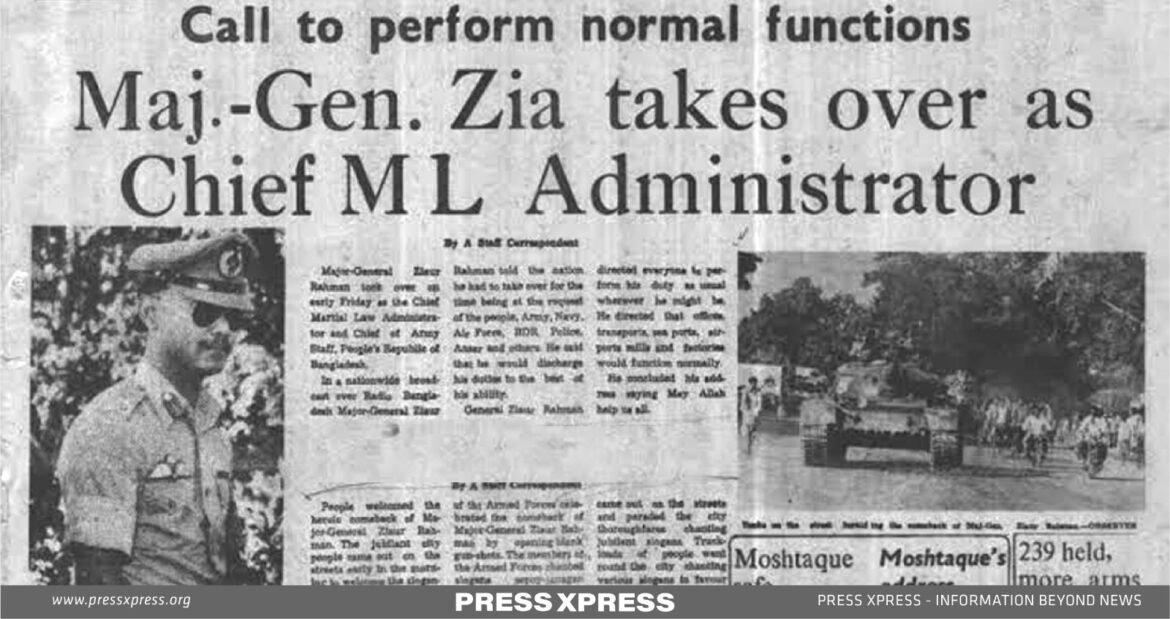In the political landscape of Bangladesh, the birth of the Bangladesh Nationalist Party (BNP) on 1st September 1978 marked a pivotal moment, yet one shrouded in controversy and undemocratic origins. The party, founded by the country’s first military dictator, Ziaur Rahman, emerged from the ashes of a fake plebiscite, raising questions about its legitimacy and its role as a puppet base for the authoritarian ruler.
You Can Also Read: BNP’s Non-Participation Won’t Affect Credible Elections
Ziaur Rahman, having seized power through a dubious national vote of confidence in 1977, aimed to solidify his grip on the state by ostensibly restoring democracy in 1978. However, this so-called restoration was nothing more than a facade, as Professor Shams from RMIT University, Melbourne, Australia, reveals unsettling parallels with Pakistan’s repressive regime that unleashed genocide in 1971.
General Ziaur Rahman’s actions, following the tragic events involving the assassination of Bangabandhu Sheikh Mujibur Rahman and nearly his entire family, and the equally brutal assassination of four national leaders, cast serious doubt over his character and his rule. The illegitimate seizure of state power through a ‘yes or no’ vote, devoid of prior democratic processes, paints a picture of authoritarian maneuvering. Streets filled with Zia’s posters and forced voting, even by children, underscore the lack of genuine democratic practices.
A Birth Based on Duplicity
The cornerstone of BNP’s inception lies in a manipulated referendum marred by a low turnout and dubious results. Professor Shams recalls that the turnout was artificially inflated, with Ziaur Rahman allegedly garnering around 90% support in some areas, surpassing the total number of registered voters in those centers. The irony is not lost as BNP continues to label this undemocratic process as “a great exercise of the democratic franchise,” a sentiment challenged by seasoned journalists and researchers.
Historians highlights the illegitimate nature of Ziaur Rahman’s rise to power, emphasizing the absence of prior meetings, processions, or campaigns before the ‘yes or no’ vote that saw him illegally seize state power. The streets were adorned with posters of General Zia in military uniform, creating an atmosphere of fear and panic. Even children were reportedly forced to cast votes, underscoring the lack of genuine participation in the electoral process.
Ziaur Rahman’s subsequent formation of the Bangladesh Nationalist Party further fueled suspicions about the party’s democratic credentials. By bypassing state policies and holding key positions in the army and as president, Zia established BNP as a puppet organization, claiming victory in the so-called presidential election of 1978 amid reports of inflated votes by various foreign media outlets.
Participating in the 1978 presidential election from BNP, General Zia’s legitimacy has always faced scrutiny for the reported 120% votes in some areas by various foreign media outlets. The suspicious voting percentages contribute to the narrative of a party founded on manipulation rather than genuine democratic processes.
A Military Dictatorship in Disguise
BNP’s alliance with Jamaat-e-Islami in attempts to restore a “Pakistan military-fundamentalist model of radical Islam” only serves to reinforce the undemocratic nature of the party. The genesis of BNP as a puppet base for Ziaur Rahman and a party primarily comprising unelected ex-army members raises serious questions about its commitment to democracy and its ability to serve the people.
The undemocratic roots of BNP, conceived in barracks rather than the villages, towns, and cities where true democracy flourishes, cast a long shadow over the party’s legitimacy. Analysts argue that a party formed undemocratically lacks the competence and political leadership necessary for a genuine democratic system. The absence of grassroots connections, vital for building bonds with the people, further compromises BNP’s ability to compete in an openly democratic environment where the power lies with the people to choose competent leaders.
The story of BNP’s origin is a tale of deception, manipulation, and undemocratic practices. Its foundation in a fake plebiscite orchestrated by a military dictator reveals a party that was not born out of the will of the people but was rather a strategic move to consolidate power. As Bangladesh continues its journey in the realm of democracy, the shadow of BNP’s undemocratic pedigree looms large, challenging the party’s credibility and its capacity to represent the true aspirations of the nation.
As Bangladesh continues its political journey, it becomes imperative to reflect on the roots of its political entities critically. BNP, ostensibly established to champion the interests of the people, stands on shaky ground due to its tainted beginnings. The interplay of deception, oppression duplicity and the manipulative tactics employed by Ziaur Rahman, unveils a narrative that challenges the democratic credentials of Bangladesh’s Nationalist Party.


